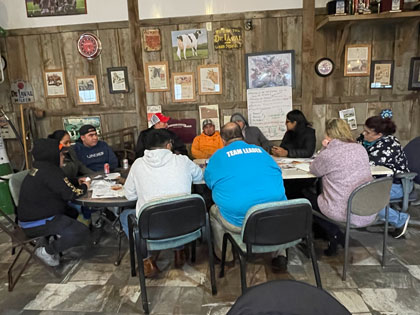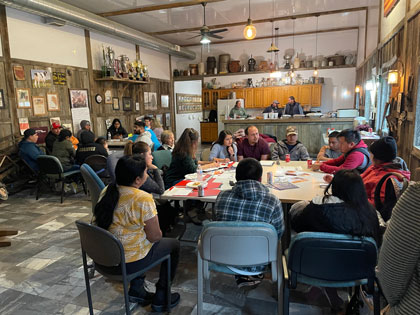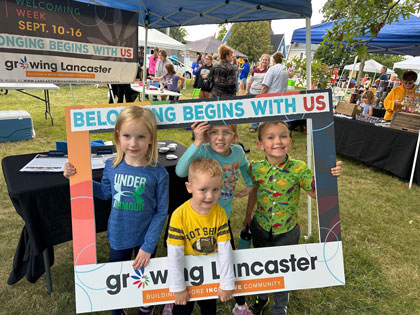success story
Growing Lancaster aims to attract Latino families
Growing Lancaster aims to attract Latino families
Diversity builds economic growth
 Community leaders in Lancaster, in Wisconsin’s southwest corner, began to worry about the city’s economy. They noticed jobs sitting vacant, stagnant school enrollment, an aging population, and a lack of affordable housing. Nearby cities were attracting Spanish-speaking residents to fill workforce needs, but Lancaster wasn’t. Leaders of the city’s largest employers, Grant Regional Health Center and the global packaging company Amcor, began meeting in 2022 to brainstorm ideas to attract more people to Lancaster. “If we’re going to grow, we’re going to need a diverse workforce,” says Dave Smith, president and CEO of Grant Regional Health Center.
Community leaders in Lancaster, in Wisconsin’s southwest corner, began to worry about the city’s economy. They noticed jobs sitting vacant, stagnant school enrollment, an aging population, and a lack of affordable housing. Nearby cities were attracting Spanish-speaking residents to fill workforce needs, but Lancaster wasn’t. Leaders of the city’s largest employers, Grant Regional Health Center and the global packaging company Amcor, began meeting in 2022 to brainstorm ideas to attract more people to Lancaster. “If we’re going to grow, we’re going to need a diverse workforce,” says Dave Smith, president and CEO of Grant Regional Health Center.
Launching a community effort
A committee took shape and gave itself a name that defined its mission: Growing Lancaster. Representatives from business, industry, health care, government, education, and banking started meeting once a month, brainstorming ideas to add diversity. Less than 2% of Lancaster’s approximately 4,000 residents belong to racial or ethnic minorities, according to 2021 U.S. Census Bureau data. The committee set its sights on attracting Latino families—one of the fastest-growing population segments in the U.S., as well as in several neighboring Wisconsin communities. To bring those residents to Lancaster, the community knew it would need to make this cultural group feel welcome and provide amenities to meet their unique needs.
 Grant Regional Health Center had already hired a bilingual physician. After a focus group with Spanish-speaking employees at a nearby farm, the Growing Lancaster steering committee used recommendations that emerged from the session to establish its top priorities: Offer English language classes, provide banking assistance, and open a grocery store.
Grant Regional Health Center had already hired a bilingual physician. After a focus group with Spanish-speaking employees at a nearby farm, the Growing Lancaster steering committee used recommendations that emerged from the session to establish its top priorities: Offer English language classes, provide banking assistance, and open a grocery store.
Southwest Wisconsin Technical College and Amcor came through with funding for English classes, and Spanish classes are now available at the hospital and for individual business owners. Growing Lancaster held a Welcoming Week, in conjunction with the Lancaster Area Chamber of Commerce’s outdoor market, featuring music and a city proclamation that declared: “Welcoming Week is about bringing neighbors together across lines of difference to build relationships and work together on shared goals.” Local businesses posted welcome signs and window clings, and staff wore welcome buttons in several languages. The initiative also included creation of a banking access guide.
A partnership between the City of Lancaster and the Madison-based Wisconsin Management Company—along with a $3.4 million grant from the Wisconsin Neighborhood Investment Fund and a $600,000 loan from the Great Day in the City of Lancaster Fund—has enabled the construction of new apartments to combat the housing shortage. Two 20-unit apartment buildings are expected to open in 2024 for residents earning up to 80% of the median income. “It will be a place for folks to get a start,” Smith says.
Opening a grocery store for the Latino population will take a bit longer. Growing Lancaster is still trying to find the right entrepreneur to undertake this effort and is hoping to make a connection through the Wisconsin Latino Chamber of Commerce in Madison or with Latino grocers in the nearby communities of Darlington, Fennimore, Boscobel, and Platteville.
Building diversity through inclusion
 It may be too soon to measure results with hard data, but Smith says he believes Growing Lancaster already is making an impact. More businesses want to get involved, and Smith says he has recently noticed more people speaking Spanish in the city’s parks and more Latino family gatherings in the community.
It may be too soon to measure results with hard data, but Smith says he believes Growing Lancaster already is making an impact. More businesses want to get involved, and Smith says he has recently noticed more people speaking Spanish in the city’s parks and more Latino family gatherings in the community.
“This is a big community effort. Everyone is pitching in to make this work,” Smith says.
Next steps include more involvement with the school district, highlighting opportunities for immigrant entrepreneurs, and conducting another focus group to set priorities for 2024, says Marie Barry, director of community economic development for the Rural Wisconsin Health Cooperative.
Lancaster Mayor Stuart Harper says he hopes to see residents build relationships that make Latino newcomers feel included in the community. “It’s accepting new people and welcoming their differences. We hope to ensure that all families are welcome in our community, and that they feel accepted, secure, and connected,” he says.
“If we’re going to grow, we’re going to need a diverse workforce.”



